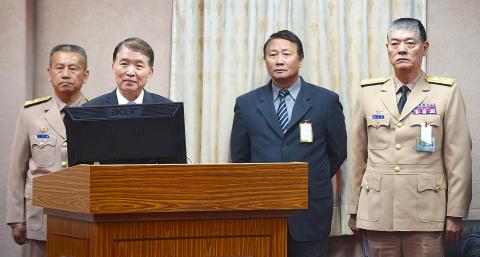Parents and politicians on Tuesday were infuriated when they found a government-sponsored educational Web site to promote national defense concepts showing a video of China’s People’s Liberation Army (PLA) on parade, along with about 40 World War II movies that were produced by the Chinese government.
The controversy also riled opposition legislators at the legislature’s Foreign Affairs and National Defense Committee meeting yesterday, who accused top military officials of negligence for helping Chinese propaganda materials reach Taiwanese.
The Web site that broadcast the videos is among the programs managed by the National Defense Education Center, a collaboration between the Ministry of National Defense and the Ministry of Education, and is based at Hsinchu Senior Girls’ High School in Hsinchu City.

Photo: Liu Hsin-de, Taipei Times
Democratic Progressive Party (DPP) Taichung City councilors Chen Shih-kai (陳世凱) and Hsieh Chih-chung (謝志忠) on Tuesday said it was egregious that the Ministry of Education is apparently unable to distinguish between our own military and enemy troops.
“If our students’ education on national defense has to depend on China to supply the materials, then our national security is in trouble,” Hsieh said.
Their sentiments were echoed by DPP Legislator Hsu Tain-tsair (許添財), who questioned Minister of National Defense Kao Kuang-chi (高廣圻) at the legislature over the matter.
“Our nation is facing a perilous situation with the threat of force from China. However, we are also facing real dangers of subversion from within, and cooperation with the enemy by Taiwanese who are bought off to work for China. This Web site is helping China to promote their military might and to destroy our national identity,” Hsu said.
He demanded that Kao and his military officials make a full investigation, since the Web site and the education center are part of a defense ministry program.
After the issue was raised on Tuesday, the Chinese video materials in question were removed, and officials at the education ministry promised to beef up the Web site’s internal monitoring and checks mechanism.
School principal Lu Shu-mei (呂淑美) said that the videos were uploaded by an assistant at the National Defense Education Center, which provides materials for teachers.
“Maybe the assistant believed those videos would help teachers to better understand China’s military threat against Taiwan, so she decided to put them online for viewing. We understand it could cause controversy, due to people’s different interpretations, so the videos have been taken off,” Lu said.
However, National Federation of Teachers Unions president Chang Hsu-cheng (張旭政) suspected a hidden agenda by the Ministry of Education.
“China’s military parade with PLA troops on display to mark victory over Japan in World War II demonstrated only China’s viewpoint. It is totally different from the Taiwanese historical view,” he said.
“We see the adjustment of the high-school curriculum guidelines was led by pro-China academics. So I suspect this is also the case — that a few officials’ political concepts and ideology now have full influence over the education ministry,” he said.

AGING: As of last month, people aged 65 or older accounted for 20.06 percent of the total population and the number of couples who got married fell by 18,685 from 2024 Taiwan has surpassed South Korea as the country least willing to have children, with an annual crude birthrate of 4.62 per 1,000 people, Ministry of the Interior data showed yesterday. The nation was previously ranked the second-lowest country in terms of total fertility rate, or the average number of children a woman has in her lifetime. However, South Korea’s fertility rate began to recover from 2023, with total fertility rate rising from 0.72 and estimated to reach 0.82 to 0.85 by last year, and the crude birthrate projected at 6.7 per 1,000 people. Japan’s crude birthrate was projected to fall below six,

US President Donald Trump in an interview with the New York Times published on Thursday said that “it’s up to” Chinese President Xi Jinping (習近平) what China does on Taiwan, but that he would be “very unhappy” with a change in the “status quo.” “He [Xi] considers it to be a part of China, and that’s up to him what he’s going to be doing, but I’ve expressed to him that I would be very unhappy if he did that, and I don’t think he’ll do that. I hope he doesn’t do that,” Trump said. Trump made the comments in the context

SELF-DEFENSE: Tokyo has accelerated its spending goal and its defense minister said the nation needs to discuss whether it should develop nuclear-powered submarines China is ramping up objections to what it sees as Japan’s desire to acquire nuclear weapons, despite Tokyo’s longstanding renunciation of such arms, deepening another fissure in the two neighbors’ increasingly tense ties. In what appears to be a concerted effort, China’s foreign and defense ministries issued statements on Thursday condemning alleged remilitarism efforts by Tokyo. The remarks came as two of the country’s top think tanks jointly issued a 29-page report framing actions by “right-wing forces” in Japan as posing a “serious threat” to world peace. While that report did not define “right-wing forces,” the Chinese Ministry of Foreign Affairs was

PREPAREDNESS: Given the difficulty of importing ammunition during wartime, the Ministry of National Defense said it would prioritize ‘coproduction’ partnerships A newly formed unit of the Marine Corps tasked with land-based security operations has recently replaced its aging, domestically produced rifles with more advanced, US-made M4A1 rifles, a source said yesterday. The unnamed source familiar with the matter said the First Security Battalion of the Marine Corps’ Air Defense and Base Guard Group has replaced its older T65K2 rifles, which have been in service since the late 1980s, with the newly received M4A1s. The source did not say exactly when the upgrade took place or how many M4A1s were issued to the battalion. The confirmation came after Chinese-language media reported